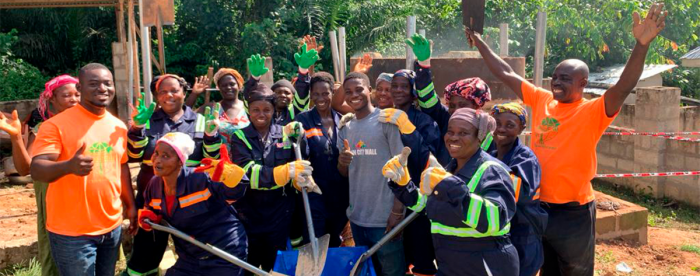News
Our stories ... ...

Ghana - 19 April, 2024
In a groundbreaking move, as part of MoMo4C, Tropenbos Ghana has launched a Waste-to-Energy pilot project in the Sefwi Wiawso Juaboso Bia (SWJB) landscape with an all-women cocoa cooperative. By turning cocoa waste into a valuable resource, this model aims to create new avenues for income generation, livelihood diversification, and long-term sustainability in the landscape, particularly for women and young smallholder farmers.
Situated in the Western North Region of Ghana, The Sefwi Wiawso Juaboso Bia (SWJB) landscapes, are predominantly characterised by cocoa cultivation and hold one of the country’s highest levels of biodiversity and intact high forest, especially the Bia Conservation Area. However, a concerning trend has emerged over the past three decades as cocoa farms have progressively expanded into forested areas. While many large cocoa buying companies now aim to purchase only from farmers that do not contribute to deforestation, not all farmers can be reached and often income remains low, urging farmers to expand their area or seek alternative ways to increase their income. In particular, female members of farmer families look for off-farm economic activities, but find it hard to access the technical support and finance needed to set up such activities.
In response to this, Tropenbos Ghana has started the cocoa Waste-to-Energy initiative under the Mobilising More for Climate (MoMo4C) programme, aiming to address the issue and promote more diversified, sustainable land use practices in the region.
Cocoa pod husk is a secondary by-product of cocoa cultivation and has traditionally been viewed as a waste material with limited economic value. However, Tropenbos Ghana, in collaboration with Zaacoal Ghana Ltd., a national leading green charcoal producer, is challenging this perception. The process involves carbonisation, where cocoa biomass is transformed into charcoal briquettes, offering a sustainable and eco-friendly energy solution for both domestic and industrial use.
Members of the Nyame tease women cooperative on top a pile cocoa pod husk
Partnerships with off-takers such as Zaacoal Ghana Ltd. play a pivotal role in making this local business a success. The partnership ensures market access for the transformed waste, creating a circular economy that benefits smallholder farmers, local communities and the environment.
The members of the cooperative received a comprehensive two-day training on cocoa pod husk semi-processing (i.e., carbonisation) using a metal kiln in a controlled environment. This training was facilitated by Mr. Lukman Adam, a technician from Zaacoal Ghana Ltd. It included safety and best practices with the aim of equipping women with essential skills and knowledge for cocoa biomass carbonization. The training took place at Sefwi Domeabra, where Tropenbos Ghana established a pilot facility for the carbonization process.
Moreover, recognising the importance of logistical support, Tropenbos Ghana has provided the women cooperative a brand-new tricycle for transporting the raw materials (cocoa pod husks), personal protective equipment and tools. This approach ensures that the farmers have the resources they need to make this initiative a success, fostering empowerment and sustainability at the grassroots level.
Member of the Nyame tease women cooperative riding the brand-new trycicle
“We are excited to be selected to lead and pilot this interesting innovation, the waste-to-energy business case. For us, it is an opportunity to demonstrate our strength, resilience, and efforts to enhance our livelihoods.” by Mad. Lucy Yeboah, Chairperson – Nyame tease Women Cocoa Cooperative (December 06, 2023)
The Waste-to-Energy pilot not only serves as testing ground for the Nyame tease Women Cocoa Cooperative, but also sparks enthusiasm among other cooperatives in the landscape. The outcomes derived from this pilot are anticipated to lay a solid foundation for learning and evaluation, with the ultimate goal of replication and up-scaling across the SWJB landscape. Tropenbos Ghana’s Waste-to-Energy initiative is not just about converting waste into energy,it is about transforming communities, fostering economic empowerment and paving the way for a more sustainable future.
MoMo4C is a joint project of IUCN NL, WWF Netherlands and Tropenbos International, and six partner organisations in our landscapes.